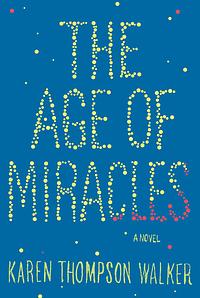Take a photo of a barcode or cover
Young adult book. An interesting premise with good character development and put build up but it just didn't live up to it's promises.
I suspect that sci-fi geeks will have real problems with this book. Me? I'm not a sci-fi geek, but I was at times troubled by the lack of detail about "what's really going on here". Still, I really enjoyed The Age of Miracles because I loved Julia; she was real and endearing, and very much a sixth grader. If you ARE a sci-fi geek, go for it anyway, but know that you're not going to get the science you're looking for. Tune in instead for a clever concept and a truly well-written protagonist.
A tight beautiful read. Nothing extraneous here. A gorgeous little piece of science fiction writing.
I would characterize this book as light sci-fi (not sure if that’s a thing). And I found it absolutely fascinating. The premise is that the rotating of the earth gradually starts to slow down. It’s subtle at first and then becomes more dramatic. It’s so interesting to see how people handle the changes and how the longer stretches of daylight and darkness affect pretty much everything. It’s told through the viewpoint of Julia, an adolescent, so it has a nice coming of age framework as well. I’d recommend this to anyone.
I really enjoyed this book and was surprised by being teary eyed at the end! She wrote very believably as a 6th grader and her friends and I enjoyed her writing style. A good coming of age story.
I was expecting something much more thought-provoking. Comparisons to Margaret Atwood? Not so much. This was a YA book with a speculative fiction premise. A 12-year-old navigates middle school, and, by the way, the earth's rotation is slowing. Not much of real consequence happens. It's weird to say, but the stakes seem low, in spite of the possibility that life on earth is doomed.
A really wonderful, interesting, and unique read. Karen Thompson Walker uses an apocalyptic backdrop -- one that reminded me of what it was like to grow up in a post 9/11 world, and what it's like to exist in this time of pandemic and climate chaos -- as metaphor for all the joy, pain, and confusion of family life, middle school, and growing up. I loved this book. As good as YA fiction gets! I look forward to reading more by KTW.
The set up for this book was so good. I really enjoyed reading how society kept changing as the problem continued. However, the end just fizzled for me.
I've been dying to read this book and I'm so happy I finally got to it! The story is a unique take on the end of the world as told through the eyes of a lonely eleven-year old girl. Oh, how I related to this character. The desire to belong. The longing to be a part of a group, but not willing to sacrifice your true identity. And all of this happening while the days are growing longer and longer and the earth is getting stranger and stranger. It's a beautifully written tale and I was sad when it was over. It left a mark on my heart.
While this book wasn't quite what I expected, I did enjoy it.
I thought this book would go more into the solutions for the worldwide disaster. I pictured it overflowing with science and engineering... inventors trying to fix the Earth. Instead, it was the story of how this major event affected the life of a middle school girl.
Like I said, though, I did enjoy the story. I found a lot of parallels between the disaster of "the slowing" and the changes that come about in Middle School. The loss of contact. The strangeness of the changes in culture, in personalities, in living. I tried to read it as an allegory and sometimes that fit very well, but in places is was baggy or pulled tight: not a perfect fit.
Julia's story is worth reading. The affect on the slowing on ordinary people is heartbreaking at times. The rumors, fear, anger, and sadness feel like what would really happen in such an event. I liked how the accumulation of the disaster is shown. I just had to suspend my scientific disbelief at times.
Overall, I did enjoy this book, even if it wasn't what I expected to read. It's a coming of age novel, set in an age when the world is rather mirroring the microcosmic turmoil of being a young adolescent.
I thought this book would go more into the solutions for the worldwide disaster. I pictured it overflowing with science and engineering... inventors trying to fix the Earth. Instead, it was the story of how this major event affected the life of a middle school girl.
Like I said, though, I did enjoy the story. I found a lot of parallels between the disaster of "the slowing" and the changes that come about in Middle School. The loss of contact. The strangeness of the changes in culture, in personalities, in living. I tried to read it as an allegory and sometimes that fit very well, but in places is was baggy or pulled tight: not a perfect fit.
Julia's story is worth reading. The affect on the slowing on ordinary people is heartbreaking at times. The rumors, fear, anger, and sadness feel like what would really happen in such an event. I liked how the accumulation of the disaster is shown. I just had to suspend my scientific disbelief at times.
Overall, I did enjoy this book, even if it wasn't what I expected to read. It's a coming of age novel, set in an age when the world is rather mirroring the microcosmic turmoil of being a young adolescent.




